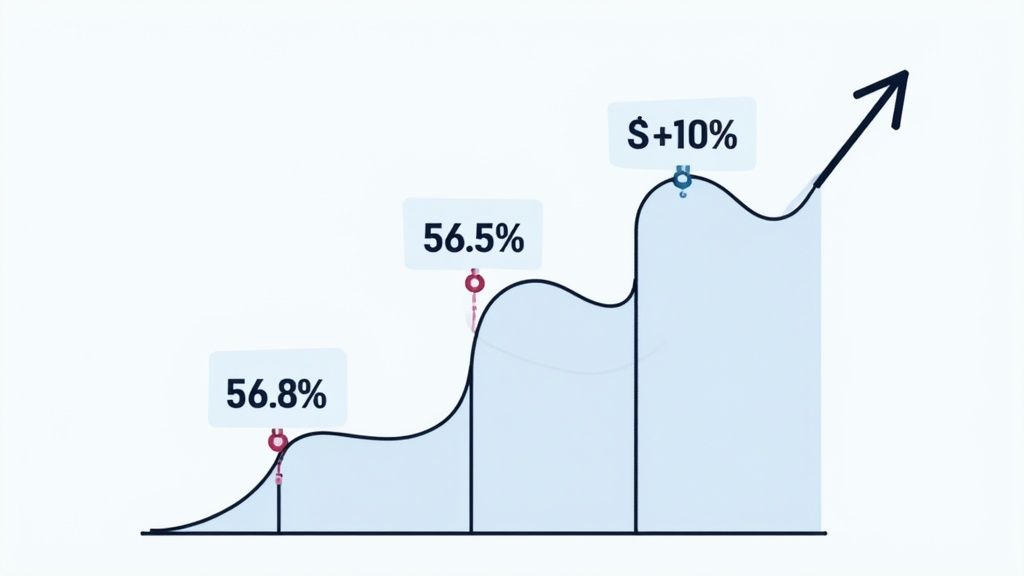
Content Marketing Manager Salary: Top Career Trends
Published
The Evolving Role of Content Marketing Managers

The role of a content marketing manager has changed dramatically. It's no longer simply about crafting blog posts or scheduling social media updates. These managers are now essential to shaping business strategy and driving tangible results. This naturally impacts content marketing manager salary expectations. Companies recognize the value of content expertise and are investing accordingly.
From Content Creator to Strategic Leader
This shift is fueled by the growing importance of content in attracting, engaging, and retaining customers. A strong content strategy can position a brand as a thought leader, build trust with potential clients, and ultimately boost sales. This means content marketing managers are no longer just managing content; they're managing customer relationships and impacting the bottom line.
The rise of digital platforms has also broadened the role's scope. Content marketing managers now oversee strategies across various channels. These include websites, social media platforms, email marketing, and video platforms like YouTube. They must create a cohesive and effective content experience that resonates with the target audience, regardless of platform. This expanded responsibility further justifies higher salary expectations.
The content marketing industry has seen a shift in salary trends. As of 2025, full-time content marketers earn an average of $113,276 annually. This marks a 4% increase from 2024's average of $108,824. This growth demonstrates the industry's resilience despite challenges. Some of these challenges include smaller internal content teams and increased reliance on freelancers.
However, while average income has risen, the median annual income has dropped from $105,000 to $100,000. This suggests a growing gap between higher and lower earners. Factors like survivorship bias, where higher-earning marketers remain, may skew the average upwards. Content Marketing Managers must adapt to these market changes as they oversee content strategies across various platforms. More detailed salary statistics can be found here: https://www.superpath.co/blog/content-marketing-salary-report
The Skills of a Top-Earning Content Marketing Manager
As the role evolves, so do the necessary skills. While creative writing skills remain essential, analytical abilities are increasingly critical. Successful content marketing managers need data analysis skills. This includes tracking key metrics and demonstrating the return on investment (ROI) of their work.
They must connect their efforts directly to revenue and customer acquisition. This data-driven approach justifies higher content marketing manager salaries and demonstrates their value. This blend of creativity and analytical skill positions them as strategic business leaders who drive measurable results. This skill set evolution directly impacts salary expectations, especially for experienced managers.
Breaking Down Real Content Marketing Manager Salaries

Understanding content marketing manager salaries requires a closer look at the current market. Instead of broad, unhelpful ranges, we'll explore actionable data based on company size, industry, location, and skillset. This information is valuable for both job seekers and employers aiming to establish competitive compensation.
Decoding Salary Disparities
Experience is a primary factor affecting salary differences. Entry-level content marketing managers typically earn less than their more experienced counterparts. This is due to the fact that experience brings a deeper understanding of content strategy, a demonstrable track record, and stronger leadership skills.
Specialized skills, like SEO expertise or video production, also play a key role. A content marketing manager with advanced SEO skills, for example, might earn a higher salary because of the growing importance of organic search.
Location is another important element. Major cities with higher costs of living generally offer higher salaries. However, the increase in remote work is changing this dynamic, enabling professionals in more affordable areas to access competitive salaries from companies worldwide. This shift introduces new considerations into salary negotiations as companies balance location-based pay with remote work flexibility.
Globally, content marketing salaries can vary significantly based on experience and location. Highly experienced Content Marketing Managers, especially those with eight or more years under their belt, can earn substantial salaries, sometimes reaching $15,000 per month. In the United States, the average annual salary for a Content Marketing Manager was reported as $77,858 as of April 2024. Salaries can range from $36,000 to $129,500 depending on skill, location, and experience.
To illustrate this further, let's look at a comparison of average salaries based on experience:
Content Marketing Manager Salary by Experience Level: A comparison of salary ranges for content marketing managers based on years of experience across different regions.
| Experience Level | US Average | Europe Average | Asia Average | Remote Positions |
|---|---|---|---|---|
| Entry-Level | $45,000-$60,000 | €30,000-€40,000 | $25,000-$35,000 | $40,000-$55,000 |
| Mid-Level | $60,000-$85,000 | €40,000-€60,000 | $35,000-$50,000 | $55,000-$75,000 |
| Senior-Level | $85,000-$120,000 | €60,000-€90,000 | $50,000-$75,000 | $75,000-$110,000 |
Note: These figures are approximate and can vary.
As the table shows, there's significant upward movement in salary as experience increases. The rise of remote positions also offers competitive compensation across different experience levels. Further information can be found here: Global Salary Benchmarks for Remote Marketers
The Total Compensation Package
Beyond base salary, the total compensation package is a significant consideration. Performance bonuses, equity options, and benefits such as health insurance, retirement plans, and paid time off all contribute to the overall value. These perks can substantially increase the total compensation and should be evaluated when considering job offers. A lower base salary might be offset by a generous bonus structure or valuable equity. For more insights, see: Digital Marketing Salary
Industry and Company Influence
Industry and company size significantly impact content marketing manager salaries. Certain industries, such as technology or finance, often offer higher salaries because of increased competition and revenue potential. Larger, established companies typically have more structured compensation plans and resources, allowing them to offer higher salaries and more comprehensive benefits than startups or smaller businesses. Understanding the industry and company context is essential for accurate salary benchmarking.
Where Content Marketing Managers Stand in the Pay Hierarchy

Understanding how content marketing manager salaries compare to other marketing positions is essential for evaluating your own compensation. It's important to look beyond simple comparisons and delve into the complexities of how salaries are determined across the marketing field. This knowledge will help you make informed decisions about your career path and maximize your earning potential.
Content Marketing vs. Other Marketing Roles
While content marketing is a critical component of building brand awareness and engagement, compensation in this area sometimes lags behind other marketing disciplines. This isn't necessarily a reflection of the role's significance, but rather a result of various market forces.
For instance, Advertising and Promotions Managers and general Marketing Managers often command higher median salaries. As of May 2024, data from the U.S. Bureau of Labor Statistics (Advertising, Promotions, and Marketing Managers) shows a median annual wage of $126,960 for Advertising and Promotions Managers and $161,030 for Marketing Managers. Comparatively, Content Marketing Managers typically earn between $60,000 and $87,000, representing the 25th to 75th percentile range, with top earners reaching $115,500 annually. This illustrates the wide range of compensation levels within the marketing field.
This disparity in pay raises an important question: why the difference? One factor may be the perceived "tangibility" of results. Traditionally, advertising and promotions have readily available metrics tied to immediate sales, making it easier to quantify their impact. Content marketing, while equally important, frequently focuses on long-term brand development and customer engagement, which can make it harder to directly correlate content efforts with immediate sales revenue. This can sometimes impact perceived value during salary negotiations.
Specialized Content Roles and Premium Compensation
There are avenues within content marketing to achieve higher earnings. Specializing in a particular area within content marketing can often lead to greater compensation compared to general marketing positions. Developing expertise in a niche area like SEO or video marketing, for example, can significantly boost your earning potential. These specialized skills are highly sought after, allowing skilled professionals to command higher salaries.
The industry you choose also plays a crucial role. Certain industries, such as technology or finance, consistently offer higher content marketing manager salaries. This is often due to increased competition for top talent and higher overall revenue streams within these sectors. Therefore, strategically selecting your industry can positively impact your earnings trajectory. For more insights on related roles, check out resources like Social Media Manager Salary.
Strategic Positioning for Higher Earnings
Successful content leaders often position themselves strategically to secure higher salaries by demonstrating clear value and measurable results. This involves directly connecting content strategies to business objectives and showcasing a strong return on investment (ROI). By demonstrating how their work drives customer acquisition, brand awareness, and ultimately, revenue growth, content marketing managers can effectively justify higher compensation.
To further illustrate salary variations within the marketing field, the following table compares median salaries and potential growth across different marketing roles:
Marketing Roles Salary Comparison
Comparison of median salaries across different marketing positions to show how content marketing manager compensation compares to related roles
| Marketing Role | Median Annual Salary | Salary Range | Growth Potential |
|---|---|---|---|
| Content Marketing Manager | $80,000 | $60,000 - $115,500 | Moderate to High |
| Marketing Manager | $161,030 | Varies widely | High |
| Advertising & Promotions Manager | $126,960 | Varies widely | Moderate |
| Social Media Manager | $50,000 - $80,000 | Varies widely | High |
| SEO Specialist | $60,000 - $90,000 | Varies widely | High |
This table highlights the salary differences between content marketing managers and other related roles. While the median salary for content marketing managers may be lower than some other positions, the potential for growth, particularly with specialization, remains strong.
This strategic approach, combined with developing specialized skills and choosing the right industry, empowers content marketing managers to earn salaries comparable to, or even exceeding, those of traditional marketing directors.
The Hidden Factors Driving Content Marketing Pay

While experience and location play a significant role in determining a content marketing manager's salary, several other important factors often fly under the radar. These less obvious elements can significantly impact your earning potential. Understanding them is crucial for maximizing your compensation.
Certifications and Specializations That Boost Earning Power
Technical certifications can substantially increase your earnings. Certifications in areas like SEO, analytics, or specific content management systems (CMS) like WordPress demonstrate a higher level of proficiency. These credentials signal a commitment to professional development and expertise, often justifying a higher salary.
Furthermore, specializing in a niche area within content marketing, such as video marketing, email marketing, or content strategy, can also command premium rates. These specialized skills are frequently in high demand, providing a competitive advantage during salary negotiations. You might be interested in: Influencer Marketing Manager Salary.
Industry Expertise and Its Impact on Compensation
The industry you work in also plays a significant role in your compensation. Certain industries, such as technology or finance, typically have larger marketing budgets and higher overall pay scales. Consequently, content marketing managers with experience in these industries can often negotiate higher salaries. Their specialized knowledge of the target market becomes a valuable asset.
Company Stage, Business Model, and Salary Structures
A company's stage of funding and its business model greatly influence its compensation structure. Startups, for instance, might offer lower base salaries but compensate with higher equity potential. Established corporations, conversely, tend to offer more structured salary ranges and comprehensive benefits packages. Understanding these different structures is key to setting realistic salary expectations.
Emerging Skills and Responsibilities: The Future of Content Marketing Pay
The content marketing field is constantly changing. As new technologies and platforms emerge, content marketing managers must adapt. Organizations are willing to pay top dollar for professionals with in-demand skills like data analysis, AI-driven content creation, and personalization.
Taking on expanded responsibilities, such as leading a content team or developing a comprehensive content strategy, can also justify a higher salary. Demonstrating leadership and a forward-thinking approach is crucial for maximizing your earning potential in the dynamic world of content marketing.
Charting Your Path to Six-Figure Content Leadership
Reaching a six-figure content marketing manager salary isn't a matter of chance, but of strategic career planning. This section explores real-world examples of how successful content leaders have ascended the compensation ladder. We'll examine key inflection points, specialized roles, and even lateral moves that can boost your earning potential.
Identifying Key Inflection Points for Salary Growth
Several career milestones typically correlate with significant salary increases. A major jump often occurs during the transition from mid-level to senior-level content marketing manager. This signifies not just years of experience, but also a demonstrated ability to lead, strategize, and deliver measurable results. Moving into a management role, where you oversee a team and shape the overall content strategy, is another key inflection point.
For example, shifting from managing individual projects to leading a content team often unlocks a new compensation level. This reflects the increased responsibility and impact on the organization's overall content marketing success. Transitioning from a generalist role to a specialist role is another such inflection point.
Specialized Roles and Their Premium on the Market
Certain specialized roles within content marketing command higher salaries. A Content Strategist, for example, often earns more than a general content marketing manager due to the strategic, high-level nature of the work. Similarly, a Head of Content or Content Director, responsible for overseeing an entire content department, can expect significantly higher compensation. These leadership roles demand a comprehensive understanding of content strategy, team management, and business objectives.
Furthermore, niche expertise in areas like SEO or video marketing can boost your earning potential. These in-demand skills increase your value, allowing you to negotiate for higher salaries. Developing deep expertise in a specific area, combined with a proven track record of success, can differentiate you and significantly impact your earnings.
Strategic Sideways Moves and Alternative Paths to Higher Compensation
Sometimes, a lateral move can be the most strategic route to a higher salary. Transitioning to a related leadership role, such as Director of Audience Development or Head of Content Operations, can provide a substantial compensation increase. These roles often leverage similar skills and experience as content marketing management but may reside in different departments with different pay scales.
Exploring adjacent leadership paths, such as moving from content marketing to product marketing, can also lead to higher earnings. Product marketing requires a deep understanding of customer needs and market trends—skills readily transferable from content marketing. This transition can broaden your skillset and unlock higher-paying opportunities.
Timing Your Career Moves for Maximum Impact
Timing is critical when aiming for six-figure earnings. While frequent job-hopping may seem tempting, it can signal instability. Successful content leaders often strategically time their career moves, balancing ambition with the need for stability and growth within an organization.
This involves establishing a strong reputation within a company, consistently delivering excellent results, and then leveraging that success to negotiate promotions or raises. Waiting for a major project completion or a successful campaign launch before seeking a new opportunity can strengthen your negotiating position and maximize salary growth while maintaining career stability.
Mastering the Content Marketing Salary Negotiation
Negotiating salary can be intimidating, but with the right preparation, you can secure the compensation you deserve. This section offers proven strategies specifically for content marketing roles. We'll cover effective tactics, real-world examples, and practical scripts to help you confidently navigate salary discussions.
Quantifying Your Content Achievements
One of the most important steps in salary negotiation is clearly communicating your value. Instead of simply listing your responsibilities, quantify your accomplishments using metrics that resonate with hiring managers. For example, instead of stating "I managed the company blog," explain how "I increased blog traffic by 30% year-over-year, resulting in a 15% increase in leads." This data-driven approach demonstrates your direct impact on the company's bottom line and supports your request for a higher salary.
Here are some key metrics to emphasize:
- Traffic growth: Showcase increases in website visitors attributed to your content.
- Lead generation: Demonstrate your content's contribution to acquiring qualified leads.
- Conversion rates: Highlight improvements in conversion rates linked to your content strategy.
- Engagement metrics: Share social media engagement (likes, shares, comments) and email open rates to illustrate audience interaction.
- ROI: When possible, quantify the return on investment from your content marketing campaigns.
Presenting these metrics provides concrete evidence of your contributions, strengthening your negotiating position.
Timing and Approach: The Art of the Ask
Knowing when and how to bring up salary is just as crucial as what you say. The optimal times to negotiate are typically during the initial job offer or during your annual performance review. When discussing a job offer, express enthusiasm for the position but clearly state your salary expectations.
During performance reviews, showcase your achievements and how you've surpassed expectations. This presents an ideal opportunity to discuss your current compensation and advocate for a raise. Successful content marketers often use this time to connect their accomplishments to their desired salary increase. Remember to consider company performance and industry trends when choosing the right time and approach.
Navigating Common Objections and Exploring Alternatives
Be prepared to address potential objections. If the hiring manager mentions a limited budget, consider inquiring about other benefits like extra vacation time or professional development opportunities. If a raise isn't feasible at the moment, explore other avenues for increased compensation, such as a performance-based bonus or a promotion to a higher-paying role within the company.
Here's an example of how to handle a budget-related objection:
"I understand budget limitations, but considering my track record of driving traffic and conversions, I believe my requested salary is justified. However, I'm open to exploring alternative compensation options, such as a performance-based bonus or opportunities for professional development." This demonstrates flexibility while reinforcing your value.
Sample Scripts for Salary Discussions
Having prepared scripts can simplify the negotiation process. Here's an example for an initial job offer:
"I'm very enthusiastic about this role and confident I can contribute significantly. Based on my skills and experience, along with the market rate for similar positions, I'm targeting a salary in the range of X to Y." This clearly communicates your expectations while allowing room for discussion.
For performance reviews: "This past year, I consistently exceeded my goals, including a X% increase in website traffic and generating Y leads. I'm committed to my growth within the company and confident I'm ready for increased responsibility and a salary that reflects my contributions."
By mastering these negotiation techniques and using concrete metrics to showcase your success, you'll be well-prepared to secure a competitive content marketing salary.
Ready to advance your content marketing career? Explore exciting opportunities with Influencer Marketing Jobs.